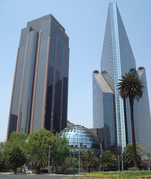Portal:Business
 Business is the practice of making one's living or making money by producing or buying and selling products (such as goods and services). It is also "any activity or enterprise entered into for profit." A business entity is not necessarily separate from the owner and the creditors can hold the owner liable for debts the business has acquired. The taxation system for businesses is different from that of the corporates. A business structure does not allow for corporate tax rates. The proprietor is personally taxed on all income from the business. A distinction is made in law and public offices between the term business and a company such as a corporation or cooperative. Colloquially, the terms are used interchangeably. (Full article...) Economics (/ˌɛkəˈnɒmɪks, ˌiːkə-/) is a social science that studies the production, distribution, and consumption of goods and services. Economics focuses on the behaviour and interactions of economic agents and how economies work. Microeconomics analyses what is viewed as basic elements within economies, including individual agents and markets, their interactions, and the outcomes of interactions. Individual agents may include, for example, households, firms, buyers, and sellers. Macroeconomics analyses economies as systems where production, distribution, consumption, savings, and investment expenditure interact, and factors affecting it: factors of production, such as labour, capital, land, and enterprise, inflation, economic growth, and public policies that have impact on these elements. It also seeks to analyse and describe the global economy. (Full article...) John Adam Eckfeldt (June 15, 1769 – February 6, 1852; usually Adam Eckfeldt) was a worker and official in the early days of the United States Mint. A lifelong Philadelphian, Eckfeldt served as the second chief coiner of the Mint, from 1814 until 1839. Eckfeldt's father owned a large smithy and involved himself in early attempts at American coinage. Adam Eckfeldt built early presses for the Mint, engraved some of its early dies, and was responsible for the designs of early American copper coinage, as well as the 1792 half disme which some authorities consider the first United States coin. He was appointed assistant coiner of the Mint in 1796, and became chief coiner on his predecessor's death in 1814.
The economy of Russia has gradually transformed from a planned economy into a mixed market-oriented economy. It is classified by the World Bank as a high-income country. It has enormous allocations of natural resources, particularly in terms of Russian natural gas and oil reserves, and thus significant economic power exists in its exports. In 2023, it was the world's 11th-largest economy by nominal GDP, 6th-largest by purchasing power parity (PPP) according to IMF, and 5th-largest according to World Bank. But in 2024 it turned out that World Bank uses obsolete data and in fact Russia was 4th-largest by PPP since 2021 and ever since. Due to a volatile currency exchange rate, Russia's GDP as measured in dollars fluctuates sharply. Russia was the last major economy to join the World Trade Organization (WTO), becoming a member in 2012. Russia's vast geography is an important determinant of its economic activity, with the country holding a large share of the world's natural resources. It has been widely described as an energy superpower; as it has the world's largest natural gas reserves, 2nd-largest coal reserves, 8th-largest oil reserves, and the largest oil shale reserves in Europe. It is the world's leading natural gas exporter, the 2nd-largest natural gas producer, the 2nd-largest oil exporter and producer and third largest coal exporter. Russia's foreign exchange reserves are the world's 5th-largest. It has a labour force of roughly 70 million people, which is the world's 7th-largest. Russia is the world's 3rd-largest exporter of arms. The oil and gas sector accounted up to roughly 34% of Russia's federal budget revenues, and up to 54% of its exports in 2021. (Full article...) "As every individual, therefore, endeavours as much as he can both to employ his capital in the support of domestic industry, and so to direct that industry that its produce may be of the greatest value; every individual necessarily labours to render the annual revenue of the society as great as he can. He generally, indeed, neither intends to promote the public interest, nor knows how much he is promoting it. By preferring the support of domestic to that of foreign industry, he intends only his own security; and by directing that industry in such a manner as its produce may be of the greatest value, he intends only his own gain, and he is in this, as in many other cases, led by an invisible hand to promote an end which was no part of his intention. Nor is it always the worse for the society that it was no part of it. By pursuing his own interest he frequently promotes that of the society more effectually than when he really intends to promote it. I have never known much good done by those who affected to trade for the public good. It is an affectation, indeed, not very common among merchants, and very few words need be employed in dissuading them from it."
The following are images from various business-related articles on Wikipedia.
Urgent and important articles are bold
The following Wikimedia Foundation sister projects provide more on this subject:
Discover Wikipedia using portals |







































